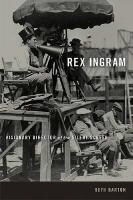Ulteriori informazioni
Informationen zum Autor Ruth Barton is lecturer in film studies at Trinity College Dublin. She is the author of Hedy Lamarr and has written several books on Irish cinema, including Irish National Cinema and Acting Irish in Hollywood . Klappentext Noted for his charisma, talent, and striking good looks, director Rex Ingram (1893-1950) is ranked alongside D. W. Griffith, Marshall Neilan, and Erich von Stroheim as one of the greatest artists of the silent cinema. After emigrating from Ireland to the United States in 1911, Ingram briefly studied sculpture at the Yale School of the Fine Arts, but he soon became fascinated by the new medium of moving pictures and abandoned his studies for a series of jobs in the nascent film industry. Over the next decade, he became one of the most popular directors in Hollywood, directing smash hits such as The Four Horsemen of the Apocalypse (1921), The Prisoner of Zenda (1922), and Scaramouche (1923). Enthralled by the artistic potential of motion pictures, Ingram excelled in bringing visions of adventure and fantasy to eager audiences, and his films made stars of actors like Rudolph Valentino, Ramón Novarro, and Alice Terry -- his second wife and leading lady. With his name a virtual guarantee of box office success, Ingram's career flourished in the 1920s despite the constraints of an increasingly regulated industry and the hostility of Louis B. Mayer, who regarded the director as a dangerous maverick. Determined to continue producing his lavish visual fantasies, Ingram persuaded MGM to fund his move from Hollywood to a small studio on the French Riviera. There, his circle of friends included glamorous American expatriates of the day -- notably, F. Scott Fitzgerald and Isadora Duncan -- as well as artist Henri Matisse and writer George Bernard Shaw. Rex Ingram follows the virtuoso director beyond his career in film to examine his controversial personal life -- including his conversion to Islam, the rumors surrounding his ambiguous sexuality, and the circumstances of his untimely death. Ruth Barton's intriguing biography not only restores a visionary filmmaker to the spotlight but also provides an absorbing look at the daring and exhilarating days of early Hollywood. ...

